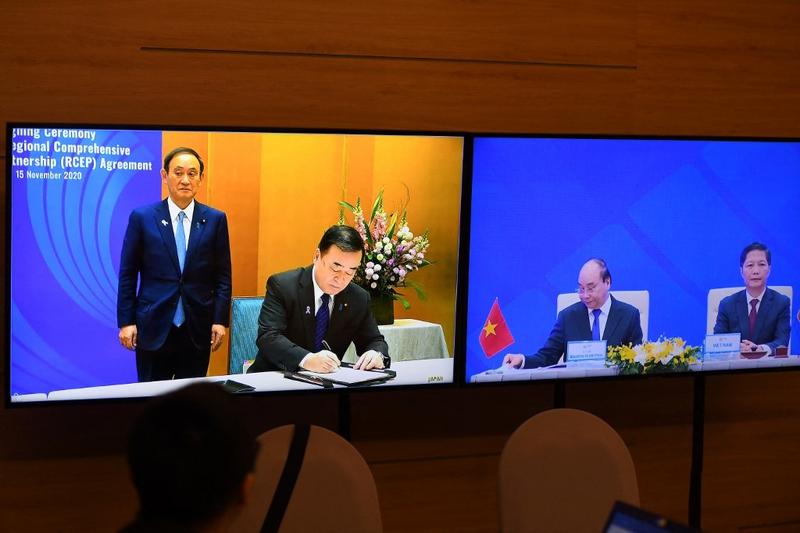 In this Nov 15, 2020 photo, Japan's Prime Minister Yoshihide Suga (center) stands next to Japan's Minister of Economics, Trade and Industry Hiroshi Kajiyama (second left) as he signs the agreement while Vietnam's Prime Minister Nguyen Xuan Phuc (second right) and Vietnam's Minister of Industry and Trade Tran Tuan Anh (right) look on, as seen on TV monitors, during the signing ceremony for the Regional Comprehensive Economic Partnership (RCEP) trade pact at the ASEAN summit that is being held online in Hanoi. (NHAC NGUYEN / AFP)
In this Nov 15, 2020 photo, Japan's Prime Minister Yoshihide Suga (center) stands next to Japan's Minister of Economics, Trade and Industry Hiroshi Kajiyama (second left) as he signs the agreement while Vietnam's Prime Minister Nguyen Xuan Phuc (second right) and Vietnam's Minister of Industry and Trade Tran Tuan Anh (right) look on, as seen on TV monitors, during the signing ceremony for the Regional Comprehensive Economic Partnership (RCEP) trade pact at the ASEAN summit that is being held online in Hanoi. (NHAC NGUYEN / AFP)
TOKYO - Japan on Friday ratified the Regional Comprehensive Economic Partnership (RCEP), the world's biggest free trade agreement, which comprises 15 Asia-Pacific countries including China and 10 members of the Association of Southeast Asian Nations (ASEAN), the Foreign Ministry said.
Singapore, for its part, ratified the RCEP agreement on April 9, 2021, and was the first RCEP participating country to complete the official ratification process
The ministry, as reported by local media, said Tokyo deposited its ratification instrument with the ASEAN Secretariat. In doing so Japan has become the third member toward the enforcement of RCEP.
The move follows Japan's upper house of parliament in late April approving the RCEP, which is expected to feasibly enter force later this year and could create the world's largest free trade zone, covering roughly 30 percent of the world's gross domestic product, trade and population.
For Japan, it will be the first trade deal that comprises both China, its largest trading partner and South Korea, its third largest trading partner.
The deal was signed by China, Japan, South Korea, Australia, New Zealand and the 10 members of ASEAN in November 2020. The pact will enter into force 60 days after it is ratified by six of the ASEAN members and three non-ASEAN countries.
China, the world's second-largest economy, completed the procedures for ratification on April 15 this year, according to the ministry of commerce.
ALSO READ: Singapore ratifies RCEP agreement
Singapore, for its part, ratified the RCEP agreement on April 9, 2021, and was the first RCEP participating country to complete the official ratification process.
The parliament of Thailand, meanwhile, approved the RCEP agreement on Feb 11, 2021, the country's Deputy Prime Minister and Commerce Minster Jurin Laksanawisit, said.
Once in effect, the deal will eliminate tariffs on as much as 90 percent of goods traded between its signatories over the next 20 years.
The deal will also standardize rules on investment and intellectual property to promote free trade among its signatories.
The Japanese government has projected that the RCEP accord will boost the country's GDP by 2.7 percent. In terms of new job creation as a result of the accord, the government said it expects that around 570,000 new jobs will be created.
This compares to the 1.5 percent GDP increase Japan estimated it will garner from the 11-nation Comprehensive and Progressive Agreement for Trans-Pacific Partnership (CPTPP).
RCEP groups together the 10 ASEAN members - Brunei, Cambodia, Indonesia, Laos, Malaysia, Myanmar, the Philippines, Singapore, Thailand and Vietnam - plus Japan, China, South Korea, Australia and New Zealand.


